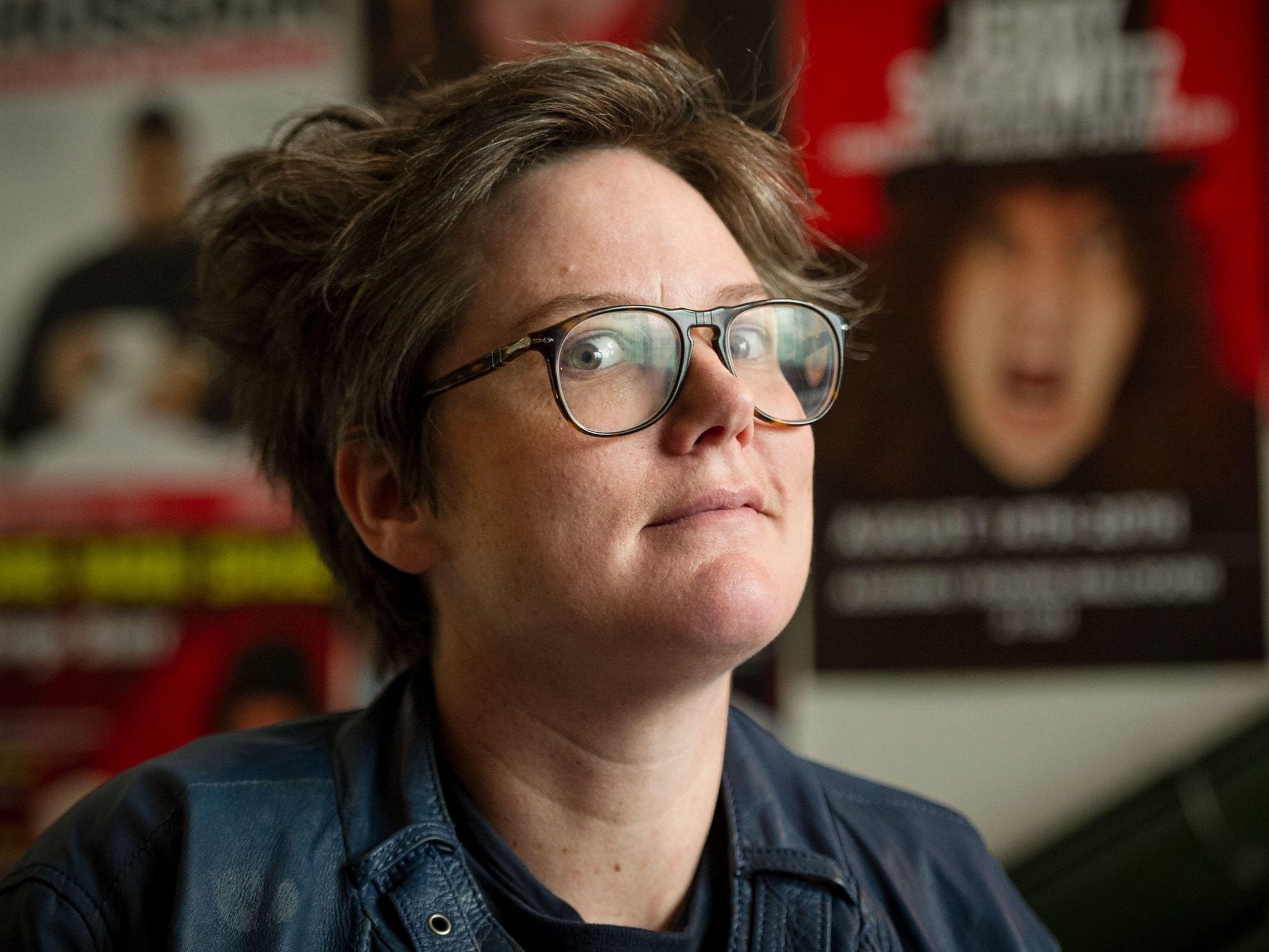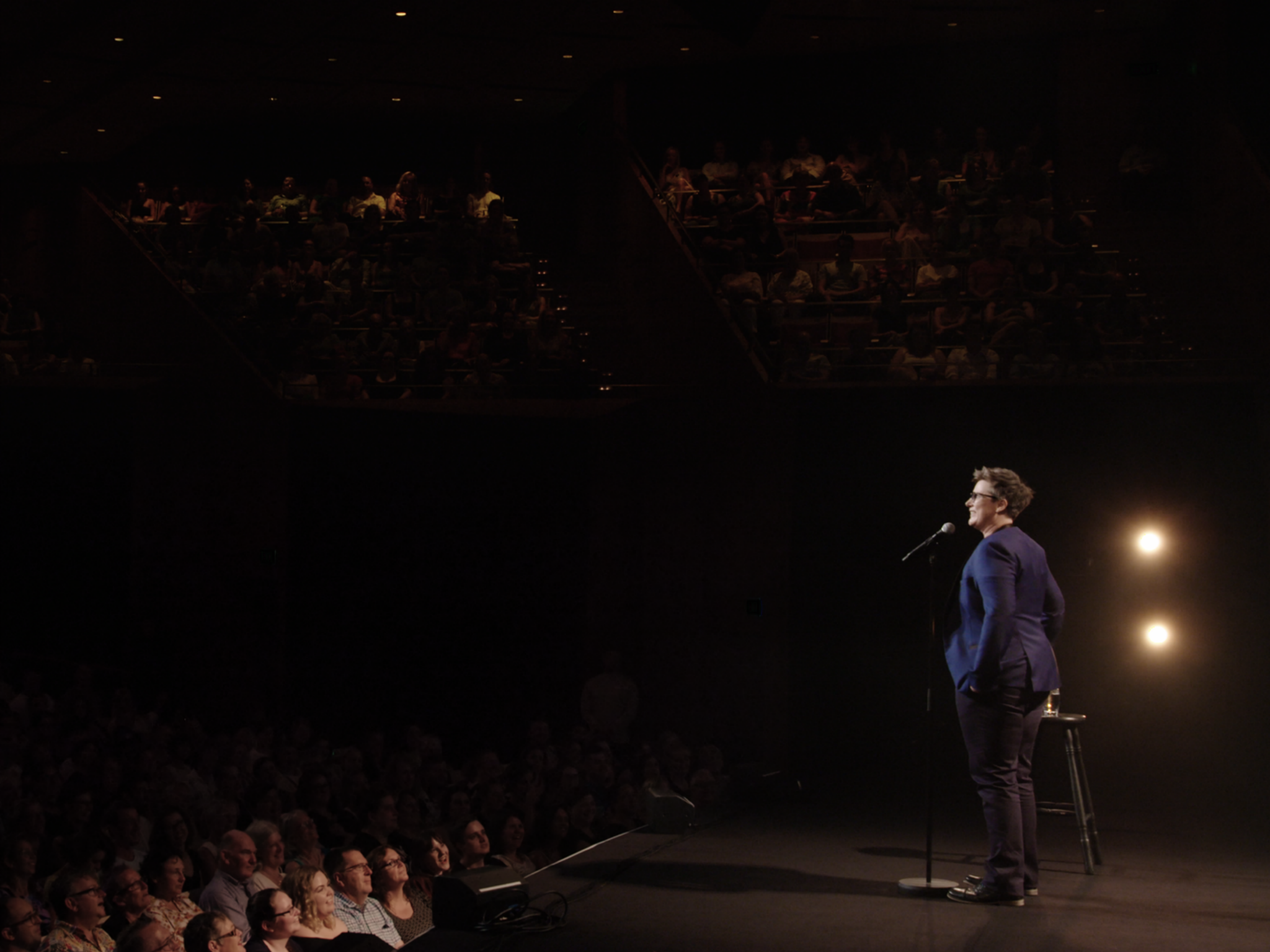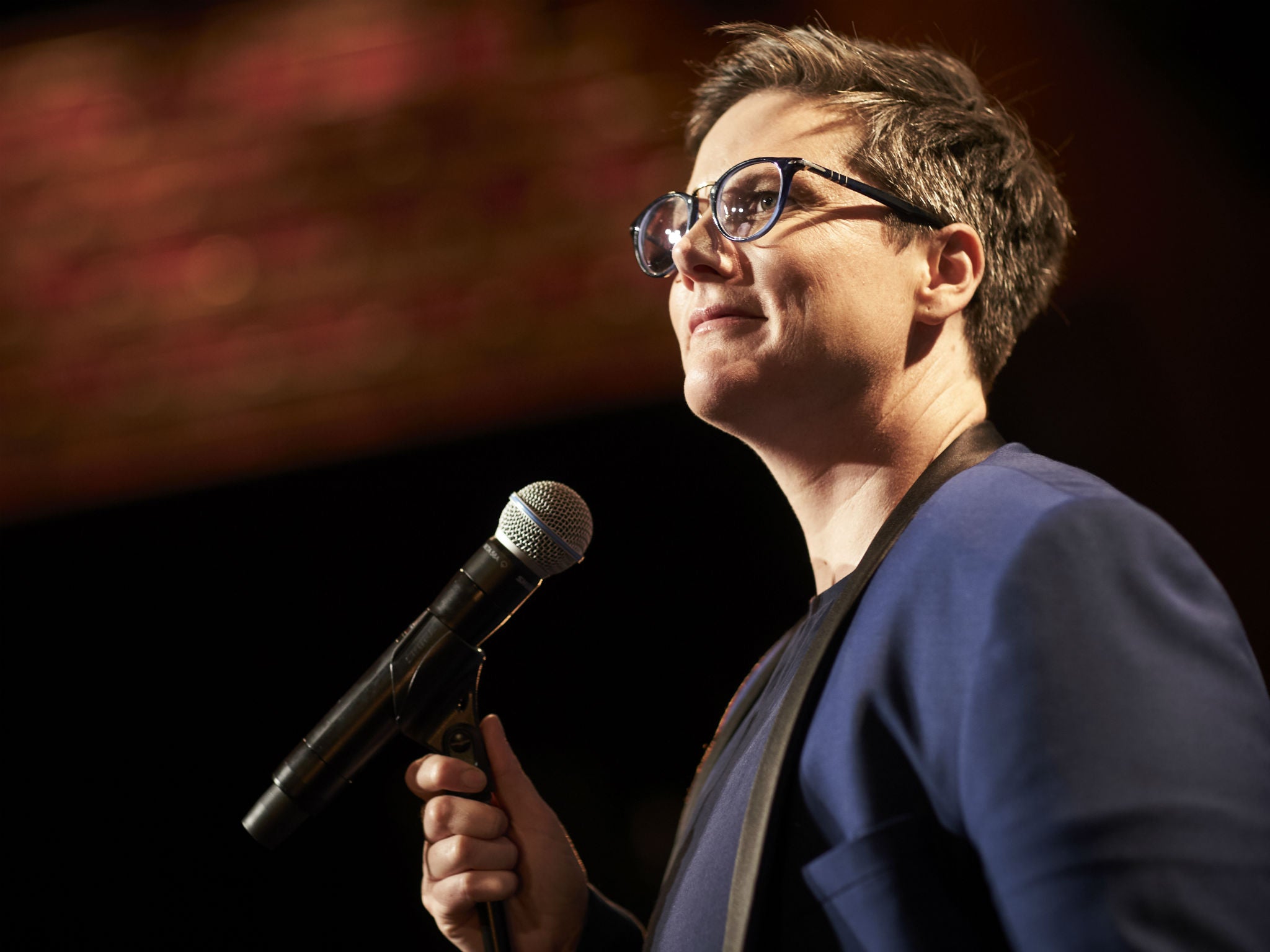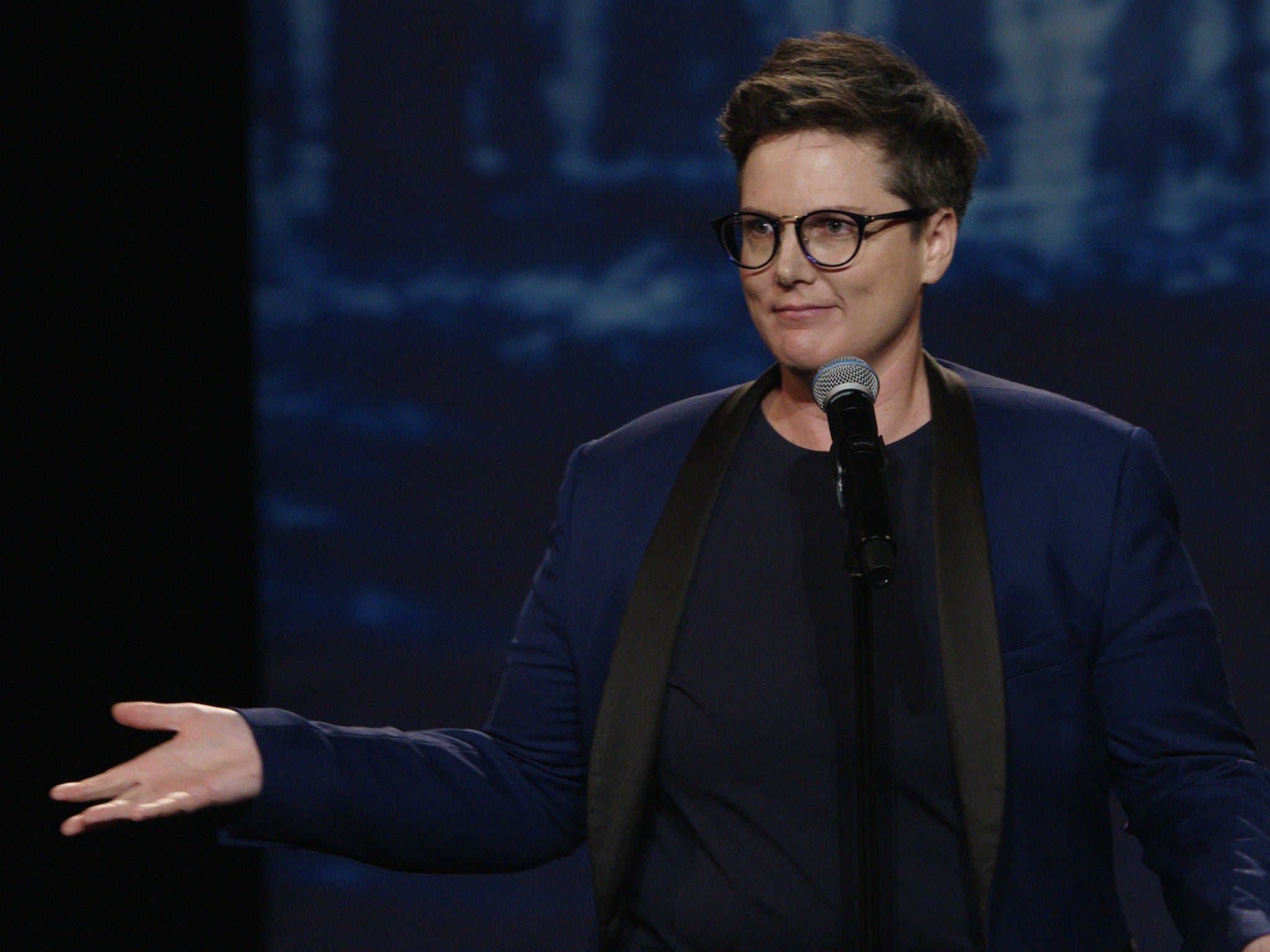Hannah Gadbsy is angry, and she's amazing
The lacerating fury of her show ‘Nanette’ has made it a huge success internationally, and on Netflix. The comedian explains why she wants to turn comedy inside-out

Your support helps us to tell the story
From reproductive rights to climate change to Big Tech, The Independent is on the ground when the story is developing. Whether it's investigating the financials of Elon Musk's pro-Trump PAC or producing our latest documentary, 'The A Word', which shines a light on the American women fighting for reproductive rights, we know how important it is to parse out the facts from the messaging.
At such a critical moment in US history, we need reporters on the ground. Your donation allows us to keep sending journalists to speak to both sides of the story.
The Independent is trusted by Americans across the entire political spectrum. And unlike many other quality news outlets, we choose not to lock Americans out of our reporting and analysis with paywalls. We believe quality journalism should be available to everyone, paid for by those who can afford it.
Your support makes all the difference.Perhaps you’ve heard: Hannah Gadsby is angry, and she is amazing.
Gadsby, an Australian comedian, is the creator of Nanette, a stage show turned Netflix special that is lacerating in its fury about how women and queer people like her, and anyone else who might behave or look “other”, get treated, dismissed and silenced. She is unflinching about the abuse that they – that she – endured, and the cultural norms that enabled it. She calls out men, powerful and otherwise.
In stark personal terms, she reveals her own gender and sexual trauma, and doesn’t invite people to laugh at it. Nanette is an international sensation, the most talked-about, written-about, shared-about comedy act in years, exquisitely timed to the #MeToo era.
And in its success Gadsby has perhaps pointed the art form of standup in an altogether new direction, even as she has repeatedly vowed, onstage, to quit the business.

“I have built a career out of self-deprecating humour, and I don’t want to do that anymore,” she says in the special. “Because do you understand what self-deprecation means when it comes from somebody who already exists in the margins? It’s not humility. It’s humiliation.”
The response to Nanette is “beyond my comprehension”, Gadsby said one recent morning. She had arrived from Australia the night before and was now blinking back jet lag, sitting at the long wooden dining table at her friend Jill Soloway’s house here in Los Angeles (the friendship was also born of the show).
She was tired, not just from the trip but also from touring this act, which stopped in New York and London, among other cities, and in 2017 won major prizes at both the Melbourne International Comedy Festival and the Edinburgh Fringe.
“Over 250 times I did that show, and it took a toll,” she said. “I need to spend the next year mostly napping.”
Comedian Tig Notaro, who chronicled her cancer diagnosis in a special that also changed her life, said she was “utterly floored” by Gadsby’s hour-long show. “Nanette should be required viewing if you’re a human being,” she said. “It really takes days to take in everything she presented, to fully comprehend it all.”
Gadsby, she added, was disrupting comedy. “It’s going to be very interesting to see what comedians do post-Nanette,” she said. It’s a dividing line. “She cleared the table for necessary regrowth.”
The creation of Nanette felt like a fever dream, prompted by Australia’s virulent debate on same-sex marriage and coming shortly after Gadsby received a diagnosis of autism spectrum disorder and ADHD. Together, those events gave her a new clarity about her life and the torment she suffered – and how things might have been different, if the world was more accepting of people like her.
“Writing the show, I think I was insane,” Gadsby, 40, said. “I was a hot mess. I had so much just suddenly crystallize in my head, and I just needed to get it out.” More than anything in her decade-plus standup career, Nanette is a manifestation of the way her mind works, she said. Performing it wasn’t therapeutic, exactly, because it’s so hard to do, she said.

“But overall, it began to hold – some other people were holding my pain, and I’ve never had that. I’ve never had that. And that has done a lot of healing, I think.”
Gadsby came by her insecurities honestly. Growing up in smalltown Tasmania, she was a blue-ribbon golfer, state champion twice over. She started playing as a kid at the little country club where her mother worked as a cleaner and where women then were not permitted to be full-fledged members.
They could tee off only at times that wouldn’t interfere with the men. Sometimes they had to stop and serve the male members tea.
Even in competition, she was made to understand a woman’s place. When her brother won a tournament, she noticed, he was awarded golf equipment, things that encouraged him to keep at the game. “I would win casserole dishes and vases,” she said. “I was basically winning stuff for my dowry.”
Gadsby long ago stopped playing golf, but those experiences shaped her worldview, especially as she watched how her feisty mother was denigrated at work, “always told she’s being a mouthy, stupid woman”.
Confrontation seemed exhausting. Instead, “I learned how to disappear,” Gadsby said. “I was invisible. I learned very early on. Well into my adult life, I was easily forgotten in a room, which meant I heard – I hear a lot.”
She is still soft-spoken, not the kind to immediately own the space. (A brief stint leading museum tours ended because her charges just wandered off. “I’m not a natural leader,” she said.) Sitting at the table, when she waded into a topic she didn’t expect to cover, she seemed a little bashful.
But when she knew she had a good joke coming, she prefaced it with a small, sideways smile; her mind was a half-step ahead of yours. She didn’t want to mention autism in Nanette, she said. “But what I want to do is sort of go, do you know what? There’s value in the differently thinking.”
Gadsby studied art history and curatorship at Australian National University in Canberra. She worked at a bookshop and at an outdoor cinema as a projectionist, then became an itinerant farmhand. She was adrift.
In her late twenties, on a whim, she entered an open-mic competition sponsored by the Melbourne Comedy Festival. It was a weird decision, but she was making a lot of those back then. She was also technically homeless at the time, she said.
She knew she was funny. “It’s how I participated in life without participating,” she said. Her first time at the mic, she did a surreal bit about freezing her dead dog. (“I’ve always been very uplifting.”)
She made it to the state finals and felt preternaturally comfortable onstage. “I’m frightened of smaller interactions, but I could talk to a large room almost immediately, which is, you know, a backward wiring,” she said.
In retrospect, her inability to engage with the world in standard fashion was related to her autism. “I could never reconcile how I could be both childlike and really, really smart,” she said. “Like, I’ve got an incredibly high IQ, but I can’t read a bus timetable.”
As she began doing comedy, her siblings – she is the youngest of five – helped her out with housing, and her parents (her father is a retired maths teacher) supported her career choice.
To navigate the neurotypical world, she said, she now knows, “I always need external scaffolding.” (Autism in women is underdiagnosed, researchers say. The revelation often comes later in life, because the signs that are familiar in men may not exist for women, and it’s largely men whose conditions have been studied. For Gadsby, the diagnosis was “both a devastating and wonderful moment”.)

Gadsby’s family knew some of the trauma she had been through, but when they came to see Nanette early on, she modified it because, she said, it was “unfair to subject them to that kind of sucker punch in a roomful of strangers”.
(Spoilers ahead.)
“I don’t want people playing detectives in my world,” she added, trying to find the perpetrators. “That’s like trauma porn – like, let’s go back and solve the crime! And I don’t think that that’s helpful at all, because that still keeps things centred on the trauma.” Better to move forward and try to change toxic and predatory male culture.
As she relived these atrocious experiences onstage, over and over again, Gadsby built up a kind of callus. Then her mother, Kay Gadsby, happened to be in the audience, at the Sydney Opera House, when the show was taped for Netflix. Gadsby couldn’t change the material to protect her that night.
Her sister and a brother were also in the crowd, but it was her mother’s shock of white hair she could see from the stage. The performance was raw before, but “having Mum in the audience, it was no skin,” she said. “You can see that in the film.” She nearly broke down before the cameras.
Audiences are in tears, too. Josh Thomas, a young Australian star who hired Gadsby as a writer and performer on his TV series, Please Like Me, about a young man coming out, thought that as a gay man with a supportive family himself, he had it easy.
“But then,” he said, “I see storytelling like Hannah’s, where she rages about the homophobia in the world, and I cry and I realise that I grew up with so much shame.”
“Nanette,” he added, “made me question if I could have made more space for people that are different, as well as empowering me to stop people from taking space away from me because I’m different. I feel like it’s permanently changed my point of view.”
One of the most ingenious aspects is how, as Gadsby works towards the most painful and shocking material, she lobs occasional straightforward jokes at viewers – her grandmother told her that Mr Right could be just around the corner; “I have been approaching every corner with caution since then,” she quips – making them into her unlikely partner in dismantling the allure of comedy altogether.
“I think that the magic trick of the show is that it is funny, and then it turns funny inside out,” said Mike Birbiglia, the comedian and filmmaker. Of Gadsby’s skill and polish behind the mic, he said, “You can tell right away, yeah, this is someone who kills all the time and then is choosing to do something different.”
In Nanette, Gadsby explains that while a story has three parts – beginning, middle and end – a joke only has two, setup and punch line. There is, therefore, no satisfying conclusion to a joke, she says, the audience’s laughter notwithstanding.
Comedians including Kumail Nanjiani and Kathy Griffin have tweeted their awe at what Gadsby accomplished. “It’ll change your life,” Griffin wrote. Netflix does not release viewership data, but judging by its social media mentions, Nanette is among its most-positively received specials ever, a spokeswoman said.
But some comedy purists have taken issue with the idea that Nanette is standup at all, although it’s billed that way online. Not enough jokes, they say.
Birbiglia, who also made his name with solo stage shows that delved into personal issues, said the show was part of a larger movement in comedy – reflected in the work of Notaro and others – to reach higher. “It just makes you think, let’s go one step deeper,” he said. “That’s what it did for me and a lot of comedians.”
Gadsby vociferously pushed back at her critics. “I’LL SETTLE THIS,” she shouted on Twitter. “My show is NOT standup comedy” because that’s an art form designed by men for men.
As a student of art history, she looked to multidisciplinary figures like Louise Bourgeois for inspiration. A few years ago, Gadsby made a comedic video series doing close reads of artworks.
In Nanette, she does an extended riff on the misogyny of Pablo Picasso, connecting it, eventually, to Donald Trump. (This, she said, is her pattern-seeing autistic mind at work.) Her early material was personal but not quite as cerebral, with bits about her weight and being a lesbian. She did the club circuit in Australia and Britain, and didn’t relish it.
“It’s unsafe for a woman,” she said, adding: “I’m not interested in talking to drunk men. I did that as a kid” in her country club days. “I didn’t like it.”
In the show, she excoriates Bill Cosby, convicted of sexual assault, and Harvey Weinstein, who is accused of it. Sitting at the dining table, we talked about Louis CK, whose comedy she didn’t particularly care for even before he admitted to masturbating in front of colleagues. The success of Nanette, she said, proved to her there was “a huge thirst for other voices”.
Gadsby began writing Nanette – it’s named for an ex, who, she said, probably hadn’t seen the show – in mid-2016. The debate over a same-sex marriage bill, which Australian lawmakers passed in 2017, unearthed her own internalised homophobia, she said. As she unravelled that in herself, she wondered if she could forge a new connection with an audience by making a show about it. She worried that it would need a trigger warning, but decided that’s what the show was partly about: the inability to have these kind of cultural conversations.
Was there also ambition, I asked her, and confidence in the comedy skills she’d honed over a decade that made her take the leap to such a difficult message? “I’m ashamed to admit that it came from somewhere a little bit more bitter,” she said.
Her career had plateaued, she felt, and as she watched mediocre men climb the entertainment ladder, she got angry: “I do what they do, and probably better, and from a harder point.”
She resolved to tear comedy down – she used a different, bodily term – “and leave”.
She mentioned Louis CK again, and the possibility he might come back. “I don’t want to stop him,” she said. “It’s worth just to see, if he does have an audience.”
There were 18 seconds left on my interview tape: I didn’t expect it to take a turn. Gadsby, of course, had other ideas. “If he does have an audience, then I won’t be quitting standup,” she said, and laughed. “Quote me on that: if Louis CK finds his audience, I will definitely not quit standup. Because my work here is not done.
“Say that I said it with a cheeky smile,” she added, and left the table.
‘Nanette’ is available on Netflix
© The New York Times
Join our commenting forum
Join thought-provoking conversations, follow other Independent readers and see their replies
Comments